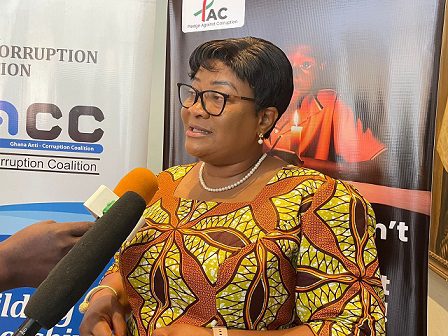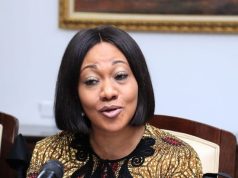The Executive Director of the Ghana Integrity Initiative (GII), Mrs. Mary Addah, has urged Ghanaians and political leaders to take a strong stance against corruption as the country approaches its 2024 elections.
Mrs. Addah speaking at the Anti-Corruption Forum held in Accra under the theme “Elections and Anti-Corruption: What is the Next Government’s Agenda?” highlighted the urgent need for unified, actionable commitments that go beyond empty promises, urging leaders and citizens to engage in the “Pledge Against Corruption” as a means of securing accountable governance.
Reflecting on past efforts, she emphasized that while civil society organizations have fought tirelessly against corruption, the desired results have been elusive.
“We’ve fought this fight individually for years, but the dividends have been disappointing,” she remarked. “Our goal now is to come together—not just as civil society groups, but as citizens committed to the nation’s progress—to demand clear, robust, and proactive anti-corruption commitments from our leaders.”
A Unified Call for Accountability and Transparency
The “Pledge Against Corruption” campaign, spearheaded by a coalition of civil society organizations, academics, private sector leaders, and concerned citizens, calls on candidates to commit to bold reforms, particularly around public accountability and transparency.
The campaign urges leaders to sign on to tangible, specific pledges, including the passage and enforcement of the Conduct of Public Officers Bill, which encompasses asset declaration, conflict of interest provisions, and a gift policy. This bill, Mrs. Addah noted, is critical to ensuring ethical conduct within the public sector.
Beyond legal reforms, the campaign advocates for enhanced transparency in public procurement, noting that procurement irregularities are a major source of corruption.
Mrs. Addah pointed out that nearly 85% of procurement processes fail to meet standard guidelines, creating significant opportunities for corruption. She emphasized the need for adherence to Ghana’s procurement guidelines and greater oversight to address these vulnerabilities.
Demand for Constitutional and Electoral Reforms
Mrs. Addah also called for a constitutional review to reduce the excessive power concentrated in the executive branch, allowing appointees greater independence to carry out their mandates without political interference.
Additionally, the campaign advocates for reforms in political party and campaign financing laws, stressing the importance of transparency in candidate fundraising to prevent corruption at its roots.
“Current laws only require parties to account to the Electoral Commission,” she explained, “but most donations are directed to individual candidates, and this lack of accountability obscures the true picture.”
The Pledge Against Corruption initiative urges both citizens and candidates to commit to a transparent political financing structure.
Mrs. Addah stressed that it’s not enough for candidates to sign pledges; citizens, too, must actively hold leaders accountable. “If we as citizens take this pledge, it empowers us to demand real change,” she stated.
A Movement for All Ghanaians
She made it clear that the Pledge Against Corruption is a call for all Ghanaians. She encouraged citizens to take ownership of the fight, emphasizing that lasting change requires widespread public commitment.
“Corruption affects every one of us, and it will take all of us to tackle it effectively,” she concluded. “This is a national effort, one that requires each of us to demand integrity and accountability from our leaders.”
As the 2024 elections approach, the Ghana Integrity Initiative and its partners hope that these pledges will shape a future where Ghana’s leadership prioritizes transparency, ethical governance, and the public interest over private gain.
The forum is part of the GACC’s Pledge Against Corruption (PAC) Campaign, an initiative supported by partners such as the Africa Centre for Energy Policy (ACEP), Ghana Integrity Initiative (GII), and IMANI, which aims to secure clear anti-corruption promises from candidates to serve as a foundation for future accountability.
Source: Isaac Kofi Dzokpo















